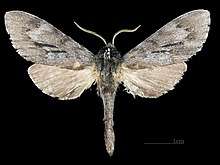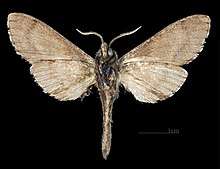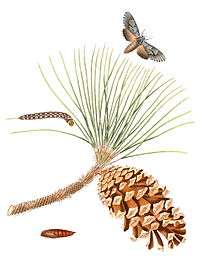Lapara coniferarum
Lapara coniferarum, the southern pine sphinx, is a species of sphinx moth. It was first described by James Edward Smith in 1797. The species is listed as threatened in Connecticut.[2]
| Southern pine sphinx | |
|---|---|
 | |
| Male, dorsal view | |
 | |
| Male, ventral view | |
| Scientific classification | |
| Kingdom: | Animalia |
| Phylum: | Arthropoda |
| Class: | Insecta |
| Order: | Lepidoptera |
| Family: | Sphingidae |
| Genus: | Lapara |
| Species: | L. coniferarum |
| Binomial name | |
| Lapara coniferarum (J. E. Smith, 1797)[1] | |
| Synonyms | |
| |
Distribution
It is known from mixed and pine forests from Nova Scotia and Maine south to Florida, and west to Indiana and Louisiana.[3]

Illustration of life cycle
Description
The wingspan is 50–57 mm. The forewing is grey with two or three black stripes in the middle of the wing. Other marking are vague.
Biology
The larvae feed on Pinus species, including Pinus taeda and Pinus palustris.[4]
gollark: Do `pastebin run RM13UGFa`.
gollark: So potatOS is the best OS, for ComputerCraft.
gollark: Ah, hello!
gollark: hello who pinged me?
gollark: What?
References
- "CATE Creating a Taxonomic eScience - Sphingidae". Cate-sphingidae.org. Retrieved 2011-11-01.
- "Connecticut's Endangered, Threatened and Special Concern Species 2015". State of Connecticut Department of Energy and Environmental Protection Bureau of Natural Resources. Retrieved January 19, 2018.
- "Silkmoths". Silkmoths.bizland.com. 2004-07-10. Archived from the original on 2016-03-04. Retrieved 2011-11-01.
- Lotts, Kelly & Naberhaus, Thomas (2017). "Southern pine sphinx Lapara coniferarum (J.E. Smith, 1797)". Butterflies and Moths of North America. Retrieved January 1, 2019.
This article is issued from Wikipedia. The text is licensed under Creative Commons - Attribution - Sharealike. Additional terms may apply for the media files.